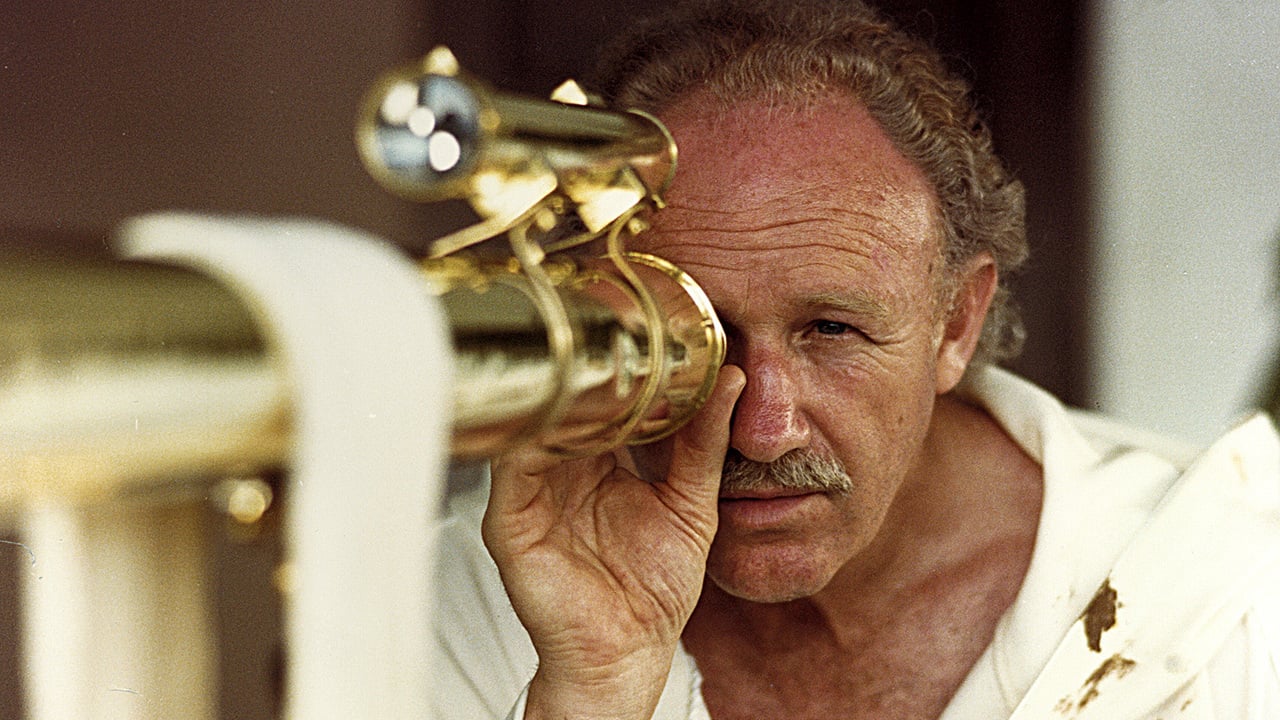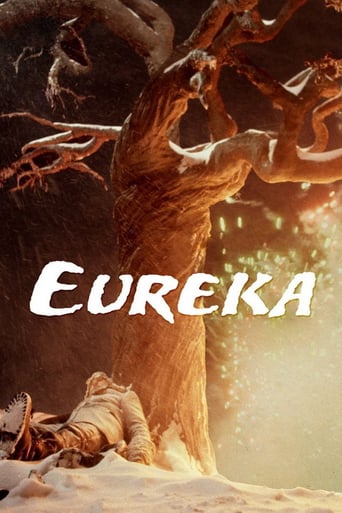

Young filmmakers, take notice. "Eureka" is a case study in bad filmmaking which could be used in filmmaking and/or film appreciation classes. The premise could have worked all right if the script had had about a half dozen additional rewrites and if the many cinematic tricks had been pared down. The story-line itself seems like it was recycled by out-of-work screenwriters dumped from "Days of Our Lives", barring the opening sequence. Part of the problem is the film throws more symbolism at the viewer than all of Orson Wells' films combined which we'll explore later. The scenes are also so overly directed the resulting cinematic experience seems more like a desperate film student trying to "prove" he is the next Orson Wells or Fritz Lang rather than allowing the characters and the scenes to tell the story.In the 1920's Jack McCann (Gene Hackman) is a gold prospector in the arctic who finally hits it rich. He doesn't just become rich, but purportedly becomes the richest man in the world, so tally up silly problem number one. (If you examine history, almost no one became the richest person in the world from gold prospecting.) Fast-forward to the 1940's, McCann now owns an island in the Caribbean. He has a daughter Tracy McCann (Theresa Russell) who has given her heart to an emotional walking soap opera, Claude Maillot Van Horn (Rutger Hauer). Of course, Claude and Jack can't stand each other, although when we first meet Tracy, I thought she had had an affair with Jack, not that she was his daughter! Tally up silly problem number two. (They actually talk about having been in Paris, similar to Humphrey Bogart and Ingrid Bergman in "Casablanca"!) Hackman for about the next hour rants and raves about Hauer groping his daughter: tally up silly problem number three. For being the richest man since John D. Rockefeller, he seems unable to control these people! Couldn't he just hire some hit-men and off this irritant? At the same time, two Italian mafia-types played by Joe Pesci and Mickey Roarke are trying to finagle Hackman into starting a casino in Miami. Several times I couldn't hear what they were saying, but, more importantly, I didn't really care! Tally up silly problem number four.Silly problem number five gets the silver medal: the shots. The shots were too innovative for their own good. Zooming in on characters when they do something "strange" or become emotional occurs ad infinitum. If a character is unhappy, zoom! If they're giving an endless tragic speech, as a fortune-teller/brothel madam does at the beginning, zoom! It's zoom in for this and zoom in for that, zooming down from above, zooming up from below. There was more zooming around than a typical Superman film. A strange episode at the beginning was supposed to be a dream sequence but there was so much zooming around and strange symbolism I didn't understand it was a dream or what it meant.Which brings us to silly problem number six: the gold medal goes to the symbolism! Yes, this film is so chock full of symbolism applied with a sledgehammer I started forgetting why I care about the story! Explosions, candles and clocks get about as much screen time as the characters in "Eureka"! They also seemed to be overt homages to Orson Wells' "Citizen Kane" referring to the exploding crystal snow globe after Kane says "Rosebud". Explosions run rampant at the beginning of the film in the arctic, including a horrid blast-your-brains-out suicide which served no purpose at all. Later it's clocks and candles. And of course all the symbols are zoomed into again from all angles imaginable. Particularly, towards the last half of the film, we're zooming to clocks! Is the filmmaker running out of footage? Candles are also everywhere. People even walk around with candles as if we're in a bad Hammer Film from the 1950's! The film is essentially a cinematic mess. For all the zooming and symbols, I couldn't get a hold of the characters. Hackman who often plays very resolved characters seemed strangely ambiguous. For a guy who has everything, he seemed to be in a real rut! Hauer is little better. He's won Theresa Russell, the most attractive character in the film, and even he doesn't seem very happy about it. Actually, Russell's character was the only one who was reasonably well-defined. But even she can't save this odd mess of a movie. Sadly it wasn't quite so bad that it was good. Essentially everything which should never be in a movie, and more.
... View MoreI too first saw this in London when it came out May 1983, at the Screen on the Hill. It was my O-level year, and I was a skinny, awkward 15-year-old, desperately trying to get into my first 18-rated film. It worked. But was it worth it? The film has an extraordinary opening section, as Gene Hackman finds the gold under the snow-encrusted earth, culminating in a spectacular, slow-motion explosion of rock and snow. Set to extracts of Wagner's DAS RHEINGOLD, it's unforgettable, thrilling cinema, and had my jaw dropping into my cappuccino. We also have the sight of a dying, half-frozen man blowing his brains out again and again, bringing to mind the disjointed, hallucinatory quality one recognises from the director of THE MAN WHO FELL TO EARTH and DON'T LOOK NOW. Stunning, disturbing stuff.Unfortunately the momentum quickly slackens as we cut forwards in time to a rather dull, plodding melodrama about a Kane-like man who in his anguish says, "Once I had it all...now I only have everything." (Coming after the prologue, this also applies to the film itself.) There's some nasty scenes involving voodoo and Rutger Hauer doing something rather strange with a python, some gut-wrenching violence involving a blow-torch and the contents of a pillow, and a soap-opera court-room finale that feels as if it's wandered in from an entirely different film altogether. There are rumours of a different film lurking in this exuberant mess: one of the film's stars has hinted that it was not Roeg's final version that we saw. But I couldn't call this a success. Roeg fans should check it out as an oddity, but be warned: after the brilliant beginning, it's downhill all the way.
... View MoreDespite intermittent evidence of Roeg's usual quality, this film can be seen as the beginning of his decline: it's interesting, certainly ambitious but, ultimately, unsatisfying. Surprisingly enough, it's not as cryptic as the director's earlier work though still not for all tastes (particularly given an irrelevant voodoo dance sequence involving a snake-infested orgy). The script is by ex-film critic Paul Mayersberg who had already written THE MAN WHO FELL TO EARTH (1976) for Roeg. The film, which could comfortably be divided into three parts, is aided by a plethora of talent both in front - Gene Hackman, Theresa Russell, Rutger Hauer, Jane Lapotaire, Ed Lauter, Mickey Rourke, Joe Pesci and Joe Spinell (a bit part as a thug) - and behind the camera (cinematographer Alex Thompson and composer Stanley Myers).The first part, in which Hackman strikes it rich, is the best with two scenes that are particularly memorable: a despairing prospector blowing his head off in front of Hackman and, then, when the latter discovers the gold mine - an almost mystical sequence; however, one still has to contend with Helena Kallianotes' eccentric performance as a fortune teller/whore who befriends Hackman. The second part, in which we see Hackman twenty years on as a tycoon with a family - all-powerful but emotionally void: this section creates some added tension with Hackman's clashes with playboy Hauer (who marries his daughter, Russell, without her father's consent) and unscrupulous business partners Pesci and Rourke, and culminates with his violent death (quite a graphic sequence, occurring about 80 minutes into the 130-minute picture!) at the hands of the latters' thugs. The third and final part, then, involving Hauer's trial for Hackman's murder is the least compelling - given the latter's obvious absence, but also the silly contrivances which dominate this section (and particularly the preposterous scene of Russell's hysterics on the witness stand, with Hauer acting as his own defense attorney!).EUREKA was shot in 1981 but the company that financed it couldn't make head or tail of it and decided to shelve the film; eventually, it was released in the U.K. in 1983 (I own a copy of the "Movies & Video" magazine from that time, which carries a reasonably favorable review of the film) and, according to "Leonard Maltin's Film Guide", didn't open in the U.S. until 1985!
... View MoreQuite a cast isn't it? Gene Hackman, Rutger Hauer, Jane Lapotaire, Theresa Russell, Mickey Rorke, Ed Lauter and Joe Pecsi, all in one film. Directed by Nicholas Roeg, who masterminded the classic Walkabout and Don't Look Now. Based on a riveting true story about a mega-rich gold prospector, Harry Oakes, who was murdered in his plush Bahamian mansion. With credentials as mouth-watering as they are, Eureka is the closest thing you'd ever get to a surefire masterpiece. Yet somehow, the handling is so over stylized and so pre-occupied by meaningless artiness that the film emerges as a complete and utter failure. A mishap of a movie to rank alongside other "movies-that-couldn't-fail-but-did", like The Adventurers (1970) and Inchon (1981).After years of gold hunting in the frozen Arctic wilderness, Jack McCann (Hackman) hits upon a massive gold claim in 1925. Immense wealth is thrust upon him. The story moves on twenty years, and McCann now owns a sun-drenched Bahamian island and has every luxury-in-life at his fingertips. However, wealth brings him little happiness. His wife Helen (Jane Lapotaire) has become an alcoholic; his daughter Tracy (Theresa Russell) has grown distant from him since marrying an ambitious playboy (Rutger Hauer); and he is being leaned on rather heavily by murderous Florida mobsters who want to build a casino on his island.Featuring the most extreme and unwatchable murder scene from any film ever made, and a host of surreal sequences, Eureka is an ultimate example of The Emperor's New Clothes-Syndrome. You are asked to watch a long film about nothing, and tricked into believing that it is some kind of deep and meaningful masterpiece. Unfortunately, it is no such thing. Rather, it is a confused, cruel, over-sexed, violent and grossly self-indulgent bomb. The stunning cinematography merely adds to the sense of regret that such promising-sounding material has turned out so utterly, utterly awful.
... View More